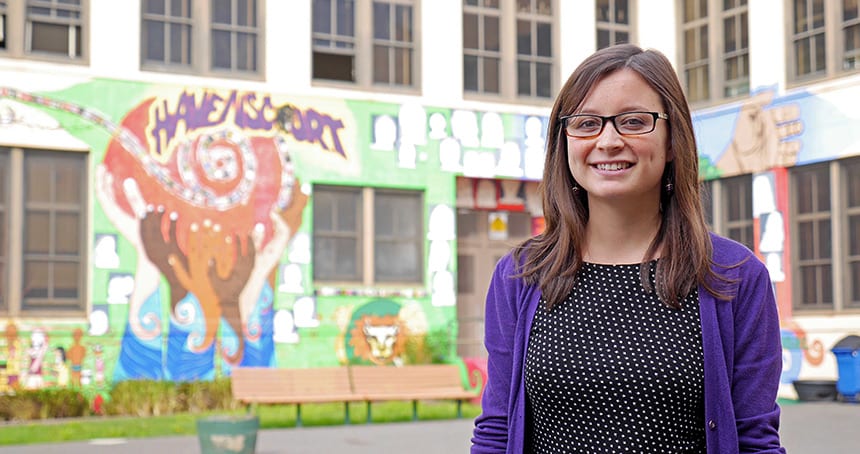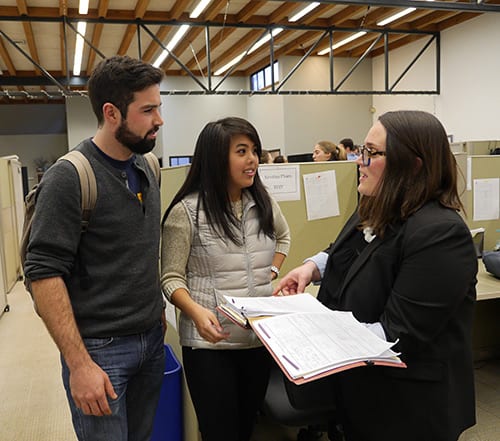
By Andrew Cohen
Mindy Phillips ’15 and Whitney Rubenstein ’14 have plenty in common. Both found a second home in the East Bay Community Law Center (EBCLC) soon after enrolling at Berkeley Law. Both strive to support at-risk youth. And both received prestigious, two-year Equal Justice Works fellowships to do just that at EBCLC.
Phillips’ initiative provides immigration legal services to Oakland public school students and their families. Rubenstein’s offers legal representation and social work support to Oakland public housing tenants who face possible eviction because of a juvenile delinquency matter. Each innovative project is improving the lives of vulnerable children.
Easing doubts, raising hopes
As a student at EBCLC, Phillips worked on Deferred Action for Childhood Arrivals (DACA) issues affecting undocumented students before interning at the center’s Immigration Program. She later worked on immigration detention at Berkeley Law’s Policy Advocacy Clinic.
In September—just weeks after taking the California Bar Exam—Phillips launched immigration clinics at four school-based health centers connected to Oakland public schools. She rotates among them as part of a fruitful alliance between EBCLC, the Oakland Unified School District and La Clinica de la Raza, which runs the health centers.
“EBCLC has partnered with Oakland schools since 2010, mostly on special education and juvenile justice issues,” Phillips said. “But we saw a fast-growing demand for immigration help, and something had to be done.”
Phillips has already received more than 100 referrals from La Clinica medical providers, teachers, administrators and families who contacted EBCLC directly; provided over 70 consultations; and taken 30 cases for representation. She regularly gives community education presentations that help families understand their rights, college access rules for undocumented students, and how to avoid fraudulent legal services.

“Almost everyone I’ve consulted with had never spoken to an attorney or anyone at the center,” Phillips said. “We’re reaching a whole new community of people that need legal help.”
Her work includes applying for DACA status for eligible students, defending asylum seekers from deportation to countries where they have been persecuted, and helping clients apply for a U-Visa—issued to victims of qualifying crimes who assist U.S. authorities in investigating those crimes. She also aids students who can receive Special Immigrant Juvenile Status—and access to a legal guardian—by having been neglected, abused or abandoned by a parent.
Joanna Bauer, who supervises one of the school health centers, called Phillips’ work “incredibly valuable.” She said immigration is “an enormous stressor on the families we work with, which obviously has a real impact on both physical and emotional health. Helping students with immigration issues unlocks doors to health benefits, college and preserving families.”
Some of Phillips’ recent achievements: renewing a student’s DACA status so she could visit a college recruiting her, representing indigenous Mayan students forced to flee their countries, and facilitating work permits for students to help support their families. Starting this week, EBCLC students Michelle Covington ’16 and Alex Epstein ’17 will help fuel those efforts.
The challenges can be daunting, and legal remedies aren’t always available. Still, Phillips calls it “an incredible privilege” to provide immigration help—often for families who faced severe danger in their home countries.
“Imagine the situation a parent must be in to put her 14-year-old alone on a bus for six weeks to the U.S., the depths of desperation and love a parent must have to do that,” she said. “I’m grateful for the opportunity to help these children find some stability.”
A helpful hybrid
During her student days at EBCLC, Rubenstein’s social work background proved “really useful in working with clients.” It struck her that “a holistic model combining legal and social work services could be quite successful.” Her fellowship, launched in 2014 and sponsored by the Morrison & Foerster Foundation and Clorox, created an ideal audience for that model: public housing tenants.
In Oakland—and in many U.S. cities—such tenants can be evicted if any household member or guest, including a minor, allegedly engages in criminal activity. Even though less than half of these arrests result in formal charges or a conviction, Rubenstein said, the Oakland Housing Authority can still commence eviction proceedings.
Rubenstein’s fellowship bridges EBCLC’s Housing Program and its Education, Defense & Justice for Youth Program—and it’s the first time the center has offered social work support to clients. Rubenstein also provides legal representation for youth in juvenile delinquency matters and families in housing matters.
“Traditional legal models view juvenile justice and housing as separate issues,” she said. “But for the people we help, they’re interconnected. We work to keep families in their home and kids out of the juvenile system.”
Oakland’s disproportionate arrest rates of poor youth of color—many of whom live in public housing—exacerbate the problem. Rubenstein noted that black youth in Oakland are arrested 23 times more than their white counterparts despite comprising less than 30 percent of the city’s youth population.
“Eviction is often the end of the line for these families,” she said. “It leads to homelessness, uproots the household, and often takes children out of school. Families get caught in systems that punish them when what they desperately need is help.”
Berkeley Law and social work students provide that help, under Rubenstein’s supervision. Fanna Gamal ’16 and Cal-State East Bay’s Lynn Barowski have each spent a year on the project, often working in tandem. While Gamal focuses on legal tasks, Barowski connects clients with services such as mental health counseling, after-school programming and employment training.
“Our clients have really benefited from having a team that viewed their case from different perspectives,” Gamal said. Barowski, who helps clients satisfy various requirements to get off juvenile probation, said combining legal advocacy and social work support “gives families a single place to get different needs met, increases their chances of getting help and reduces their chances of falling through the cracks.”
The team’s recent triumphs include restoring public benefits for a disabled mother, finding counseling for a client grieving a family member’s death, and coordinating pre-natal appointments for a pregnant client.
“Our clients deserve to have a voice within the housing and juvenile justice systems,” Rubenstein said. “It’s all about keeping families together.”